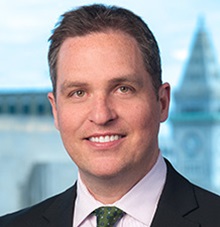Nonprofits Benefit from DLA Piper’s Real Estate Expertise
 DLA Piper attorney Brian Hochleutner was working as a litigator after law school when he got involved in a real estate case and found himself fascinated by the ins and outs of real estate law. Over the next few years, he gradually shifted his practice away from litigation and became a full-time real estate lawyer.
DLA Piper attorney Brian Hochleutner was working as a litigator after law school when he got involved in a real estate case and found himself fascinated by the ins and outs of real estate law. Over the next few years, he gradually shifted his practice away from litigation and became a full-time real estate lawyer.
Today, Brian is a partner in DLA Piper’s real estate group, where he focuses on negotiating large-scale real estate transactions and development projects. He also serves as a member of the firm’s pro bono committee, which seeks out both short and long-term volunteer projects for DLA attorneys.
Recently, Lawyers Clearinghouse reached out to DLA Piper to suggest hosting a pro bono consultation session for nonprofits seeking advice about their commercial leases. Brian and his colleagues Rich Gruenberger, Emma Yashar, and Geoff Howell agreed to coordinate, matching up teams of DLA lawyers with representatives from six area nonprofits. Over the course of a few hours one morning, the lawyers reviewed and analyzed the nonprofits’ various lease documents and worked with organizations interested in finding new office space.
Brian says he and the rest of the DLA Piper real estate group were excited to find a pro bono opportunity that meshed so well with their practice area. The firm even scored a few ongoing pro bono clients from the session, who they will assist with further lease negotiations and other real estate logistics.
Nonprofits sometimes fail to understand the importance of a real estate lawyer in negotiating or dealing with commercial leases, which differ from residential leases. Unlike residential leases, commercial leases often require negotiation to protect the tenant, including with respect to lease terms regarding tenant obligations to pay costs of insurance, utilities, and the upkeep of common areas. Because the negotiation process can be time-consuming and complex, and landlords sometimes use lease forms that are designed to protect the landlord but not the tenant, Brian says it’s helpful for nonprofits to work with a lawyer and seek out guidance as early as possible.
“Unless you have a ton of experience yourself in negotiating commercial leases, there’s just a lot of stuff you’re not going to notice,” Brian says. “Even if it’s a simple lease for a smaller organization, it can still be helpful to discuss any issues. A lawyer can help the client understand what the risks are, so they’re not surprised later and so they’re going in with their eyes open.”
To make the whole process less daunting, DLA Piper and the Clearinghouse are planning to host multiple lease consultation sessions over the next year, which are intended to serve as a sort of “checkup” for nonprofits already on a lease, or as a kick-off point for organizations in the process of finding office space.
Additionally, Brian says there is often a lot of pro bono help out there for nonprofits who need it, and many attorneys at DLA are constantly seeking out volunteer opportunities that will enable them to put their skills to use.
“In terms of supply and demand, there’s demand from the lawyers out there that want to do good pro bono work that’s interesting and helpful to someone and will give them useful assistance,” he says. “My advice would be to reach out and ask and we’ll probably be able to find someone who can help.”
Brian himself has done a lot of pro bono work, both in Boston and in Los Angeles, where he used to live. One of his favorite projects involved assisting the Girl Scouts of Greater Los Angeles, which rented multiple properties throughout the city for office space and service centers. Brian collaborated with a local real estate broker to advise the organization on the legal and business aspects of maintaining so many different leases.
Now, at DLA, Brian and other members of the real estate team help out at a Greater Boston Legal Services housing clinic, volunteer at a veterans’ clinic at the VA, and represent local nonprofits looking to purchase property or get involved in more complex development projects.
Brian says he has always felt pro bono was important, which is why he joined DLA’s pro bono committee shortly after he started at the firm in 2011. He is glad he was able to get involved in this new pro bono endeavor with the Clearinghouse, and he looks forward to many years of collaboration.
“We’re so grateful to have this relationship with Lawyers Clearinghouse,” he says. “You guys are doing such good work and we want to partner with you as much as we can.”